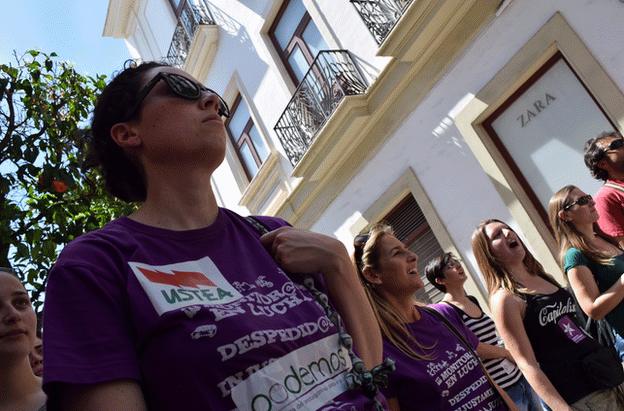European elections: Jobless but with a vote
- Published
- comments

Podemos supporters marching on May Day through Jerez, Spain
After two weeks spent meeting unemployed people in the southern eurozone who possess little more than the right to vote, I can say their attitude to the European elections is less bleak than you might assume, despite scepticism that they can achieve anything.
However, the message I gathered in Milan - it may be the richest city in Italy but unemployment in Lombardy is at its highest in a generation, external - was less one of economic anxiety than disillusionment with all politics.
An electronics engineer, who rose from poverty in the deep south to professional success in the north, told me the country needed to rediscover a passion for itself and its European identity.
"I love Italy but I feel alone," he said. Europe, he added, felt "too far away".
Radical newcomers
In Andalusia, the region of Spain with the highest unemployment (36.3%), I found some jobless people preparing to vote again for the parties of the left, which traditionally dominate politics in Seville.
Busy without a job in Spain
But others talked of a new choice, a radical party born out of the social justice movement called Podemos, which may be small but struck a chord with people like Jose, 41, who had not worked for four years and had never voted.
When I turned up in Jerez for the party's lively May Day march, external, I got three unemployed Podemos activists talking about their passion for politics.
In Seville, I met an unemployed teacher, Carmen Yusta, on the party's European election list.
Odd how you can run into a European election candidate out of the blue in the south of Europe these days.
First I met Ms Yusta at a squat party in Seville and then, on the other side of the Mediterranean at a backpackers' hostel in the Greek city of Thessaloniki, I met another woman politician - Foteini Rizou.
Out with the old?
The Greek student politician is standing for another small party of the European left called Antarsya.
It differs from Syriza, the main leftist coalition, in that it wants exit from the EU, and I detected disillusionment with Europe among most of those I interviewed in impoverished northern Greece.
Stefanos Dimoulas wants to use his vote to take Greece out of the EU
At the same time, the Greeks I met were fiercely jealous of their voting rights and the secret of the ballot box - heartening news for democracy.
That said, the feeling was that many Greeks, especially older Greeks, would endorse parties of government again: the centre-right New Democracy and socialist Pasok.
Not so in France, where I spoke to jobless people about discontent over a French state building contract being awarded to a Spanish firm in Perpignan.
"There is as much socialism in the [French] Socialist Party as there is beef in a horse lasagne," local journalist Nicolas Caudeville told me, speaking in a region with high unemployment, which still draws in desperate migrant workers from further south.
The main message I took away from my trip is that, among unemployed Europeans who will use their vote, radical new parties now hold as much appeal as the traditional parties from before the financial crisis.
You can read back through my reporting blog on Tumblr , externalor keep in touch on Twitter, external.